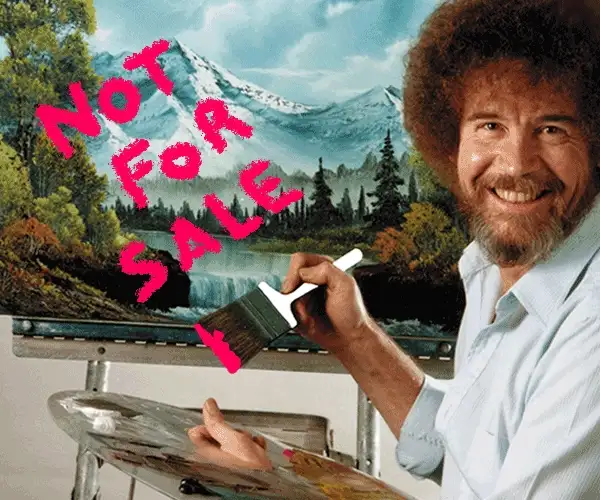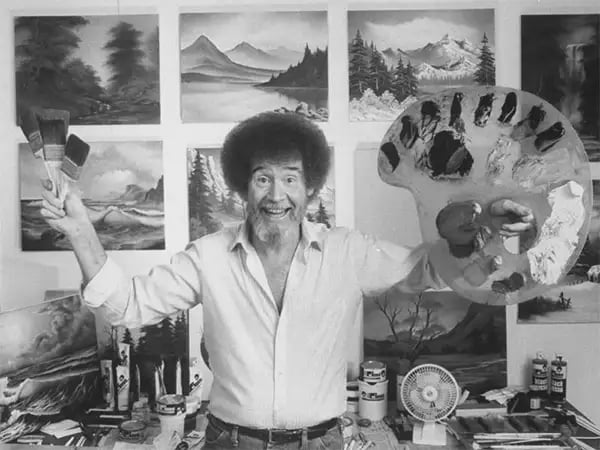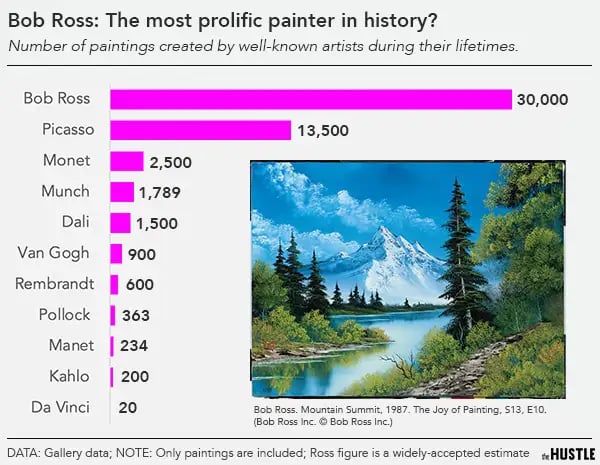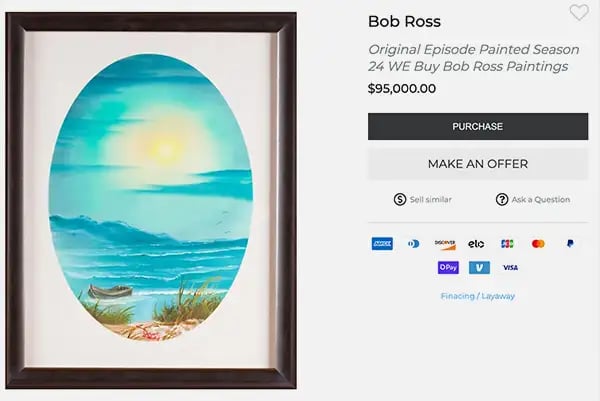
2025-06-1520:21140157thehustle.co

The famed TV artist was one of history’s most prolific painters. But finding Bob Ross paintings for sale is a long shot.
Bob Ross is not a hard man to find.

Though he died in 1995, the late TV painter remains an omnipresent cultural staple. His Chia Pet perm, nap-inducing voice, and meme-worthy sayings — “Happy little trees!” — have transcended time. On YouTube, old episodes of his show, The Joy of Painting, boast ~450m views.
Online, you can acquire Bob Ross paints, Bob Ross brushes, Bob Ross underwear, Bob Ross coffee mugs, Bob Ross energy drinks, Bob Ross watches, and Bob Ross toasters.
But there’s one thing you won’t often see for sale: his artwork.
During his lifetime, Ross produced tens of thousands of paintings. Yet, only a handful of his works have popped up for sale in recent years. When they do appear, they often fetch $10k+ and attract dozens of bids.
Why is the work of one of history’s most prolific and accessible artists so scarce on the open market?
To find out, I spoke with art gallery owners, auctioneers, art collectors, ex-colleagues who worked with Ross, and the president of Bob Ross, Inc. — the company that preserves his legacy.
Born in Daytona, Florida, in 1942, Ross dropped out of school in 9th grade to work with his father, a carpenter.
At 18, he joined the Air Force and moved to Alaska, where he’d spend the next 20 years as a drill sergeant, screaming at recruits. He was such a hard-ass that he earned the nickname “Bust ’em up Bobby.”
But his life changed when he discovered art.
Inspired by the TV painter Bill Alexander, he started painting landscapes on gold mining pans and selling them at local markets in Alaska.
His income from painting soon surpassed what he made in the military. So, in 1981, he migrated back to Florida, trained under Alexander, and became a certified painting instructor.

Bob Ross strikes a happy pose (Photo: Acey Harper/The LIFE Images Collection via Getty Images)
Now, here’s where things took a wild turn for Ross:
- One of his students, Annette Kowalski, was “mesmerized” by the jolly painter and encouraged him to strike out on his own.
- They pooled together their life savings, launched Bob Ross, Inc., and set out to make Ross into a TV star.
- A PBS executive gave them a shot.
- The show — The Joy of Painting, which aired between 1983 and 1994 — was a huge hit and was broadcast on ~300 stations to 80m+ people every day.
In each 27-minute episode, Ross would paint one landscape from start to finish, shepherding viewers through his process with a soothing disposition, entertaining commentary, and an occasional guest appearance by his pet squirrel, Peapod.
Ross didn’t get paid for his shows. But Bob Ross, Inc. — which he partially owned — used the platform to sell paints, art supplies, workshops, instructional videos, and merchandise. By 1991, it was a $15m/year ($29m today) enterprise.
The actual paintings, though, were largely an afterthought.
Over the course of his career, Ross filmed 381 episodes of The Joy of Painting. For each episode, he painted 3 versions of the same artwork — one before, one during, and one after taping.
But his TV career only scratched the surface of his total output.
Pre-fame, in Alaska, he sold thousands of paintings. And even while famous, he painted nearly every day at seminars, events, and charity auctions in between tapings.
All told, Bob Ross churned out ~30k paintings in his lifetime — nearly 3x the output of Picasso, a prolific painter in his own right.

Zachary Crockett / The Hustle (painting © Bob Ross Inc.)
For years, collectors and fans have clamored to own their own piece of Bob Ross lore. Multiple art dealers told The Hustle that demand for his work is extraordinarily robust.
But Ross paintings are a bit like diamonds: vast in volume, scarce on the open market.
Major auction houses — Christie’s, Sotheby’s, Phillips — have no Bob Ross sales history. Craigslist draws a goose egg. A scan of eBay only turns up 3 sales in the last 6 months, 2 of which are of dubious origin.
Where the heck are those 30k paintings?
As a part of Ross’s agreement with Bob Ross, Inc., the paintings he created for TV were work for hire, meaning the company maintained ownership of his work.
When Ross died in 1995, Bob Ross, Inc. (and thus, the paintings) became the sole property of Annette Kowalski and her husband, Walt.
Today, 1,165 Bob Ross originals — a trove worth millions of dollars — sit in cardboard boxes inside the company’s nondescript office building in Herndon, Virginia.
Joan Kowalski, Annette’s daughter, and the current president of Bob Ross, Inc., tells The Hustle that the company had never really given the paintings much thought.
“The paintings have always just sort of been here,” she says, with a chuckle. “We were sort of behind the times… it never occurred to us that anyone would want them.”
The company, which can be reached by dialing 1-800-BOB-ROSS, gets constant inquiries from folks about buying the paintings.
But they’re not for sale.
“Our only mission,” Kowalski says, “is to preserve the mythological wonderment that was Bob Ross.”

TOP: Joan Kowalski (top left; president of Bob Ross, Inc.) and Sarah Strohl (executive assistant) laugh at a social media post of a fan wearing Bob Ross socks; BOTTOM: Strohl sifts through some of the company’s many original Bob Ross paintings (Bill O’Leary/Getty Images)
Part of the reason Bob Ross, Inc. isn’t interested in selling the paintings is that it has far more lucrative assets on hand — like Bob Ross’s IP.
The company holds 154 copyrights, and numerous trademarks on Ross’s name and likeness, which they use to sell millions of dollars’ worth of Bob Ross-themed merchandise and instructional courses.
On occasion, Bob Ross, Inc. leases out a few paintings to galleries and exhibits around the country:
But this only answers a part of the mystery. What about all the other paintings Ross gave away or sold during his life?
Jessica Jenkins, a VP at the Minnetrista exhibit, and a Bob Ross scholar, tells The Hustle that many more Ross paintings are actually hanging in living rooms across the US.
“He was always happy to donate his paintings to fundraisers, or sell his work at a reasonable price,” she says. “Many people who own one acquired it decades ago.”
For years, WIPB-TV — the PBS affiliate station in Muncie, Indiana, where Ross filmed most of his episodes — would auction off a Ross painting at its annual fundraising drive.
According to the town’s paper, The Star Press, these paintings were always “the most anticipated item,” overshadowing tickets to Cancun, diamond necklaces, rare Beanie Babies, and basketballs signed by Magic Johnson.
“We still have 4 of his paintings hanging here at the station,” says Lori Georgi, a director at WIPB. “People come from England just to see them.”

An old newspaper clipping advertises an auction for an original Bob Ross painting featuring “majestic snow-covered mountains, a tranquil lake surrounded by towering evergreens, and a beautiful sunset sky.” (The Star Press; Muncie, Indiana, 2000)
Before he became a TV star, Ross also sold thousands of his landscape paintings at flea markets, fairs, and malls, often for small sums of cash.
This is how Larry Walton, 82, of Crosslake, Minnesota, acquired his original Bob Ross.
Back in 1980, while working as a flight instructor in Alaska, he bought a scene with mountains and blue northern lights from the then-unknown “peculiar artist” at an Anchorage fair for $60.
It spent years sitting in the garage until his son — an avid fan of Bob Ross YouTube videos — thought the signature in the corner looked familiar.
When the couple decided to sell it, they turned to Modern Artifact, an art gallery and dealer in Minneapolis, Minnesota.
Ryan Nelson, the gallery’s owner, tells The Hustle that he’s been buying and flipping Bob Ross paintings for 10 years. To find sellers like Walton, he uses SEO tactics and places “wanted” ads in local newspapers near where Ross spent time.
“We buy and sell more of his paintings than any gallery on the planet,” he writes via email. “To retain that position, we offer more money to buy his paintings than most anyone is willing to risk.”
The Waltons sold the painting to the gallery for $10k; Nelson then flipped it on eBay for a small profit.
Unlike traditional art collectors, those who possess Bob Ross paintings tend to be ordinary folks who don’t know what they’re in possession of.
“Most families that have these paintings are not millionaires,” he says, “and the money is very impactful in their lives.”

An original Bob Ross painting up for sale on Modern Artifact’s website for $95k (Modern Artifact)
Modern Artifact has sold at least 34 Bob Ross paintings over the years.
Nelson wouldn’t divulge the sale prices, but said it’s not uncommon for them to go well beyond $10k. On the site, he currently has a rare ocean scene listed for $94k.
It may seem odd that Bob Ross paintings fetch that much at market.
After all, Ross often produced a painting in less than 30 minutes (by contrast, it took da Vinci 4 years to complete the Mona Lisa), and his artwork was, by design, highly replicable.
But Nelson chalks the crazy prices up to a combination of basic economic principles and social capital.
“The bottom line is supply and demand: Bob Ross paintings are extremely tough to find, and more people want them than can have them,” he says. “They’re also the ideal conversation pieces, since they are almost universally recognizable.”

A few Bob Ross classics. TOP: Wilderness Way, The Joy of Painting, S31, E13.; BOTTOM: Northern Lights,The Joy of Painting, S8, E13. (both © Bob Ross Inc.)
Lindsey Bourret, managing director of the art appraisal site Mearto, estimates that the fair market value of a Ross painting — the price it should sell for based on precedent — is $2k to $4k. But the pop culture element to his work boosts demand.
“I would personally categorize Ross’s work as a hybrid between fine art and entertainment memorabilia,” she says.
Some buyers are willing to pay a premium for that.
One collector who didn’t wish to be named out of concern for her privacy, owns an extensive cache of artwork, including several six-figure pieces. But she considers her Bob Ross original her “crown jewel.”“I’ve had more guests comment on my Bob than my Picasso,” she tells The Hustle. “It’s really all about the story.”
Ultimately, the real reason there aren’t more Bob Ross paintings up for sale is that the artist never wanted them to be a commodity.
For Ross, the value was in the process, not the finished product.
“He was about as uninterested in the actual paintings as you could possibly be,” says Kowalski. “For him, it was the journey — he wanted to teach people. The paintings were just a means to do that.”
NOTE: Top image of Bob Ross © Bob Ross Inc.; photo illustration by The Hustle.
Read the original article
Comments
I don't know why the article and everyone here is coming away with the conclusion that Bob Ross didn't want his art to be sold.
A simpler reasoning is that there wasn't any demand for his paintings while he was alive. His show ran from 1983-1994 and he died in 1995. He was reasonably popular at that time, sure, but Bob Ross as we know him only blew up in the 2010s in the internet/YouTube/streaming age.
Now there is a trove of 1,165 paintings which are no doubt valuable, but cannot all be sold because they would flood the market and decrease their own value. So Bob Ross, Inc. is cleverly keeping them under lock and key and letting the scarcity drive prices up.
By codingdave 2025-06-1523:302 reply > Bob Ross as we know him only blew up in the 2010s in the internet/YouTube/streaming age.
No, he was just as well-known when his show was on the air. He was a household name, his paintings and style was known, and people talked about him enough to have opinions on whether he was an "artist" or just a TV show host.
I was going to call this anecdotal evidence based on it never appearing in the top 100 (or so) Nielson rated TV shows for a year, based on the lists for 1984-1995 here[0].
However, it looks like PBS never signed up for Nielson until 2009, so we have limited/no public data on viewership of The Joy of Painting (or Sesame Street, etc for that matter).
http://www.thetvratingsguide.com/2020/02/tvrg-ratings-histor...
There's a lot of TV shows out there, even in the 80s and 90s, and plenty of ways for celebrities to have their image and reputation bolstered. Ratings aren't reliable in trying to measure someone's notoriety.
Growing up in the late 80s/90s, and mostly outside of the US, I can't remember a time when I didn't know who Bob Ross was.
By mixmastamyk 2025-06-166:132 reply Inside the US, never heard of him until later 2000s or so as well. And watched PBS at times.
By fingerlocks 2025-06-166:441 reply Did you grow up wealthy in the 80s? Most people didn’t have cable television back then, it was comparatively expensive and not available outside major metropolitan areas. Most people only had a half dozen TV channels or so, and sometimes Bob Ross was the only thing on TV worth watching. Everyone knew who he was.
By mixmastamyk 2025-06-1616:21 We were not rich but had basic cable since 1979 or so. Maybe California was ahead on that front. My memory is that it only cost perhaps $10 a month in the 80s.
By tanseydavid 2025-06-1613:02 My experience was that accidentally tuning into Joy of Painting for about 45 seconds was enough to completely hook me (although I was not fully aware of this at the time).
By schwartzworld 2025-06-172:15 There was a lot less tv in the 80s. If you didn’t have cable, then you just had a handful of channels. I didn’t watch Joy of Painting, but it was pretty hard not to notice the painting Afro guy when flipping through the extremely limited number of channels most people had access to.
My sense is that he was known to frequent PBS viewers (I remember him from before 2010) — but the whole Chia-fro thing and "happy clouds" or whatever meme-like thing that comes to mind definitely took him to the mainstream crowd with the internet.
By tomstockmail 2025-06-162:10 I present the evidence of Family Guy episode _Fifteen Minutes of Shame_ airdate April 25, 2000 which had a Bob Ross bit. Bob Ross was part of the cultural zeitgeist long before the 2010s Internet memes. That has brought a new generation to him, but that's just bringing GenZ in line with the others.
By SoftTalker 2025-06-162:063 reply Agree. Few people watch PBS. The readership here is not representative.
By Brybry 2025-06-164:16 I think a lot of people who were or had kids pre-internet streaming probably watched PBS, at least sometimes.
Sesame Street, Mr. Rogers, Reading Rainbow, Joy of Painting, Arthur, Bill Nye, Barney, Teletubbies, etc.
It's not like there were a lot of TV choices for kids if their parents couldn't afford cable (and some stations like Cartoon Network didn't even exist until 1992+, I think even Disney Channel was a premium channel like HBO).
By nothrabannosir 2025-06-164:301 reply Like Sesame Street, Bob Ross was more famous than PBS. I didn’t even know what America was and I knew Bob Ross.
By JKCalhoun 2025-06-1612:50 That's wild.
By xnyan 2025-06-1620:58 In the mid 90s when Bob Ross died, 95% of American preschoolers had seen Sesame Street, at the time a show not available anywhere besides PBS.
By tanewishly 2025-06-1521:27 Bob Ross was known in my country (in Europe) due to his show at the time. Not quite universally, but probably closer to a household name than any other living painter was at the time. Dunno how it was in other countries in Europe, but still. The man was relatively well known for paintings, paintings that were regarded well by the general audience (experts: dunno).
So while maybe he couldn't be selling his paintings for 1000s to the decently-off, there clearly was ample demand. If he truly wanted to make a boatload, he easily could have.
Related: the treasure trove could easily be sold 1 painting at a time. Just don't make it regular - not once a year, but sometimes 2 in 2 months, and then 5 years nothing. That really wouldn't spurs the value that much, if at all.
By majormajor 2025-06-160:41 I think a lot of the responses to this are ignoring the things that were popular in the 90s that don't see a big spike of demand more recently.
Bob Ross was popular. Thomas Kinkade was popular. IMO it's doubtful Ross would've been as popular at retail in the 90s as Kinkade. One was a nice cute little educational show. One was "the painter of light" with a marketing engine around him. Both also had plenty of detractors from the "serious" art scene.
Why did Ross get positive associations through 2000s internet culture that Kinkade never did?
Which would you rather go buy now?
Was it just nostalgia, since he was relevant much more to the lives of the kids that grew up to create a lot of the internet culture of the time? Probably a big chunk of it.
But there's also just a certain right-place-right-time. Like, nobody seems to be going nuts about re-buying their childhood Pogs or even Beanie Babies. Ok, those were readily available at retail; Bob Ross wasn't. But Pokemon cards were too...
By khazhoux 2025-06-1521:46 > He was reasonably popular at that time, sure, but Bob Ross as we know him only blew up in the 2010s in the internet/YouTube/streaming age.
No, he was well-known already in early 90s (at least on my college campus), and his sayings were pre-internet memes. He was perfect match for slacker stoner culture
> cannot all be sold because they would flood the market and decrease their own value. So Bob Ross, Inc. is cleverly keeping them under lock and key and letting the scarcity drive prices up.
Personal pet-peeve.
And yes, I know it doesn't really matter to most people.
Still urks me.
"CANT OR WONT!?"
By smeej 2025-06-160:24 I guess you're the first person I've seen use it, so it can't rise to the level of pet peeve for me, but using "urks" instead of "irks" made me cringe on about as visceral a level!
"I don't know, can you?"
People that say that sometimes irk me with their pedantry. You don't hear it so much anymore, though, as all the people who once cared are elderly or gone.
Language is mutable. I think the best thing you could do is let it go. Perhaps even ascribe a stronger meaning to this "incorrect" usage: it theoretically could be, but it won't be, because it can't be given the circumstances.
Literally.
By nothrabannosir 2025-06-160:17 Sometimes people hide behind this detail in order to absolve themselves of responsibility, though. That’s not as benign as a mere shift in language. OP may have been pointing out responsibility rather than nitpicking language.
“We cannot pay you more, or we won’t be able to hit the margins the market expects from us this year.”
“We can’t license this sports event for wider audiences”
“We can’t sell all of Bob Ross’s paintings or their value would go down”
By makeitdouble 2025-06-1523:131 reply A way into this: it's not personal choices.
Milking every dollar out of anything valuable is burned into people's souls, and willfully decreasing the value is not a possibility.
By mandmandam 2025-06-1523:443 reply Try leaving America some time.
I promise you, there are countries out there where that type of person is widely looked down on (usually the countries that had to fight off colonizers).
I don't personally know of any, but I'd like to. Do you have some examples to share?
By mandmandam 2025-06-1610:23 > I don't personally know of any
Like I said, just look at countries which resisted colonization.
For example - one of the fundamental mechanics of colonization is to find people willing to sell out their countrymen for personal profit. While there are always a few people like this, it's far from the norm; and those people are remembered with searing hostility.
A specific example that comes to mind: British land-owners exacting high rents on Irish farmers would often seize their property and hold a local auction. The entire town would turn out, the original farmer would make a small token bid to buy back their farm, and no one would bid against them.
Ireland also invented boycotts, where the entire village would shun scummy landlords.
Egalitarianism isn't just a reaction to colonizers though - it's the default state of humanity [0].
And research shoes that placing material possessions at the centre of your life is inversely correlated to your emotional well-being [1]. Pretty hard to believe that this would be the default.
So, American culture is clearly twisted. It might not be the most perverse in the world... But it's up there. This is a fact well recognized in the world, and almost entirely ignored in America itself.
Yes, on an individual basis, Americans can be quite lovely. Friendly and well meaning, might go out of their way to help you, and so on. Sure. But the fact that Americans can really believe that humanity, at its core, is willing to sell out their neighbors for profit says everything about Americans and nothing about humanity.
0 - https://medium.com/inside-of-elle-beau/yes-our-ancient-ances...
1 - https://time.com/22257/heres-proof-buying-more-stuff-actuall...
By southernplaces7 2025-06-1613:521 reply Really? Just America? I know of no country, having lived in more than a couple of them, where people don't do what they can to make money or increase the value of what they have for personal economic benefit.
Americans are no less or more human than anyone else, and this idiotic posturing about some inherent difference that makes one group of people or country somehow stupider, more wicked or more avaricious than others is a bad habit no matter what direction it flows in or who its pointed at..
By mandmandam 2025-06-1618:211 reply > where people don't do what they can to make money or increase the value of what they have for personal economic benefit.
That wasn't the argument. You've moved the goalposts to a different stadium.
What was claimed was that "milking every dollar out of anything valuable is burned into people's souls", and somehow, from that, you heard "people do what they can to make money for personal economic benefit". Curious.
> Americans are no less or more human than anyone else
No one said Americans aren't human, or less human.
> this idiotic posturing about some inherent difference
No one said it was inherent. In fact I said the opposite; that people are generally egalitarian unless warped.
> that makes one group of people or country somehow stupider, more wicked or more avaricious than others is a bad habit
Nope. Countries have different characters, and it's okay to talk about it. Also, some countries - cough - have extremely powerful and capable groups that have been working for decades to warp the national character; say, by instilling rampant Islamophobia, or working to undermine critical thinking and general education.
I hope you ask yourself how you got this much wrong on a reading of a rather simple comment. Something clearly hit a nerve.
By southernplaces7 2025-06-172:342 reply >What was claimed was that "milking every dollar out of anything valuable is burned into people's souls", and somehow, from that, you heard "people do what they can to make money for personal economic benefit".
Both things are in most cases essentially the same, and a person trying to get every possible dollar out of anything valuable for their personal gain indeed doing what they can to make money for themselves. This is in my experience a habit not at all unique to Americans..
That aside, you generalized about America, to a degree that's absurd for a nation of roughly 320 million people, which also happens to be one of the top countries in the world for charitable giving on a per capita basis and in absolute terms.
So yes, countries can have different tendencies in certain ways, and it's possible for the narrative that people in a country buy to be warped by political interests, but even in these cases, generalization is stupid, and so too is giving a particular, fashionable focus to making americans seem to be particularly warped people about this.
Do you perhaps speak as a European? There's a continent riddled with simmering racism and many of its own social problems. If you're from any number of other parts of the world, feel free to make some concrete argument for why their people are in any way less subject to personal greed, or propaganda or failures of critical thinking.
I see no evidence of it. Nationalist idiocies, racist tendencies, propagandistic narratives and bad economic habits abount just about everywhere in the world, and in some countries much worse than in the United States, which itself has no shortage of differing opinions and critical thinkers.
It also (at least until the current orangutan came to power, again,) has historically been one of the most welcoming countries on earth for immigrants from nearly anywhere, including Islamic countries.
Again, generalizing about this country is plainly mistaken and easily at risk of being downright stupid if done out of ideological spite.
By mandmandam 2025-06-177:561 reply > Both things are in most cases essentially the same
Lol, no. Not at all.
A person doing what they can to make money for themselves might take a rough and underpaid job to support their future.
A person "milking every dollar out of anything valuable" might frack the land and ignore the costs, start illegal wars for profit, sell arms to genocidal dictators, turn healthcare into a for-profit industry, etc. You getting it?
> you generalized about America, to a degree that's absurd for a nation of roughly 320 million people
I don't love to generalize - but it isn't untrue, and I didn't pretend not to be generalizing. I could point at any number of statistics to back that up, but here's the main one: 98% of American voters decided arming genocide wasn't a red line.
> So yes, countries can have different tendencies in certain ways, and it's possible for the narrative that people in a country buy to be warped by political interests, but even in these cases, generalization is stupid,
Because Americans give to charity?? That argument doesn't track. And it's weird you think it does. Bill Gates was one of the most greedy, predatory and damaging individuals the world has ever seen; but he gives to charity to whitewash his image. You know who else gave a lot to charitable causes? Maxwell and Epstein. Citizens might give some of their disposable income, but what's that worth when they're fine with their taxes dropping bombs all over the world, funding dictators and genocidaires?
> Do you perhaps speak as a European? There's a continent riddled with simmering racism and many of its own social problems.
I speak as someone who has traveled and lived in both. And America's racism and social problems are on a different level. I never claimed Europe or anywhere else was perfect; just that America is exceptional. And it is.
> feel free to make some concrete argument for why their people are in any way less subject to personal greed, or propaganda or failures of critical thinking.
Name one other country in the world where 98% of voters would ever decide that arming genocide wasn't a red line. "Israel!" ... Ok, that one was too easy. Name one other.
> it also ... at least until the current orangutan came to power ... has historically been one of the most welcoming countries on earth for immigrants from nearly anywhere, including Islamic countries.
Lol. I don't know where you've been the past 24 years, but that's an extremely ahistorical statement. The kids in cages, which you saw, during the Trump admin, were built by Obama and persisted under Biden. Obama laid the foundation for Trump's "Muslim ban". It's weird how people forget these facts, and get real stroppy about it when they're brought up.
> Again, generalizing about this country is plainly mistaken and easily at risk of being downright stupid if done out of ideological spite.
You keep saying that, but it isn't actually true. The world has considered America the number one threat to global peace, stability and democracy for the past 22 years, and they are 100% correct to do so. There are countless reasons why - bombs dropped, dictators funded, climate damage, global propaganda, surveillance, wilful torture and other abuses of international humanitarian law, and so on.
To ignore all this because "generalizing bad" is what's actually absurd; and it's absurd that Americans can't grasp that. It's ridiculous to see them work themselves into a whataboutist lather when called out on any of it. Take a shred of responsibility for the national character which the whole world can see and which is threatening life on this planet in seven+ ways.
By southernplaces7 2025-06-1713:231 reply Your whole comment is so full of cherry-picked points, contrived arguments and bullshit in general that I don't know where to begin. You're generally arguing from bad faith and ideological fixation too.
Just a few of points though:
>A person doing what they can to make money for themselves might take a rough and underpaid job to support their future. A person "milking every dollar out of anything valuable" might frack the land and ignore the costs, start illegal wars for profit, sell arms to genocidal dictators, turn healthcare into a for-profit industry, etc. You getting it?
Say what? You're comparing an average person trying to make ends meet (presumably in some other country) with very specific, powerful, corporate or government special interests in unique positions of power to do these things in the US? You do understand that other countries also have select powerful interests doing all those things and similar for the sake of financial extraction yes?
>And America's racism and social problems are on a different level.
On which continent have their been several major wars in just the last 125 years, with ethnic cleansing and genocide as an explicit part of their tragic landscape, often supported by all kinds of regional populations? This aside from many European states also having their own enormous migrant ghettos with persistent racial tension between said immigrants and their white European neighbors.
>Name one other country in the world where 98% of voters would ever decide that arming genocide wasn't a red line.
First, did you pull the 98% out of your ass or have you a source for whatever the hell you're even talking about in this context? Secondly, many other countries sell arms to governments that have practiced genocide. I don't consider Israel a genocidal state (though its current lunatic in power is pushing the boundary) but taking that aside, it receives arms deliveries from, among others, Germany, the UK, Italy and Canada. So?
>Because Americans give to charity?? That argument doesn't track. And it's weird you think it does. Bill Gates was one of the most greedy, predatory and damaging individuals the world has ever seen; but he gives to charity to whitewash his image. You know who else gave a lot to charitable causes? Maxwell and Epstein. Citizens might give some of their disposable income, but what's that worth when they're fine with their taxes dropping bombs all over the world, funding dictators and genocidaires?
This is such a mishmash of cherry-picked stupidity that I feel silly replying, but since i'm here: What the hell do Epstein, his girlfriend or Bill Gates have to do with the general statistical tendencies of charitable giving among Americans? They neither take away from these charitable giving and tax-funded foreign aid tendencies or stain them in any way. They are separate contexts with no basis for comparison.
Also, as mentioned above, many, many countries fund dictators, or sell them weapons or contribute to dropping bombs somewhere for assorted reasons.
Generalizing isn't entirely a bad thing, but the kind you're vomiting out here is plain idiotic, ideologically fixated and loaded with ridiculously selected arguments.
By mandmandam 2025-06-1721:161 reply I don't think I could ask for a better way of precisely illustrating my points. Thanks, I guess. Good luck
By southernplaces7 2025-06-182:371 reply The only thing I illustrated was the bizarrely cherry-picked stupidity of your specific points. Arguing with people who replace rational analysis with ideological fetishism is tedious anyhow.
By mandmandam 2025-06-1811:26 Says the guy who thinks arming genocide (as called out by the UN, the Pope, every major human rights organization and the vast majority of genocide scholars) is fine - as long as other Western countries are doing it too.
By mandmandam 2025-06-179:251 reply Further evidenced by the ridiculous claim that America was "one of the most welcoming countries on earth" before Trump - as if Harris didn't just run on a platform of being harsher on immigrants than Trump, or as if Biden didn't deport more immigrants than anyone ever before, or as if Obama wasn't nicknamed the deporter-in-chief, or as if every Dem admin for 17 years hasn't increased ICE funding.
By southernplaces7 2025-06-1713:021 reply You do know how to distinguish between the number of legal immigrants a country lets in and facilitates entry for vs their efforts at stopping illegal migrants?
I have my many criticisms of US immigration policy and how its ICE agency manages its part of that, but lets compare apples to apples before throwing shit on the whole bowl of fruit.
Also, just like the U.S, many other countries (including Mexico itself by the way) enforce deportations, border controls and militarized border security against illegal migrants. It's nothing unique to the United States. The current administration has skewed the trend with its harsh rhetoric and anti-migrant policing drives but yeah, there's no shortage of documented evidence showing that the U.S. has a long history of being exceptionally welcoming to immigrants by global average standards. It's a country literally built by them, whose demographic reflects this across the board as it does in only a few other countries worldwide.
By mandmandam 2025-06-1714:431 reply > lets compare apples to apples
Yes, let's compare the Democrats immigration policy to that of other developed countries.
Which countries are separating kids from their parents in their thousands, caging them in mesh, giving them foil sheets to sleep under, making them drink toilet water, and then losing track of them completely? Name one other.
> It's nothing unique to the United States
... US immigration policy is uniquely cruel, and racist, including when Democrats are in power.
> there's no shortage of documented evidence showing that the U.S. has a long history of being exceptionally welcoming to immigrants by global average standards
Every American is an immigrant, unless you're native American (who were genocided over hundreds of years). So, yeah I guess so. Doesn't really affect the current topic though.
> It's a country literally built by them
I think you're thinking of slaves. It was built by slaves first, and then immigrants.
> whose demographic reflects this across the board as it does in only a few other countries worldwide.
... And?
For the last couple decades, US immigration policy has been one of bipartisan brutality and atrocity. It's nice that America was a melting pot for the world; it's cool that there's a mixed demographic (though I don't know how cool actual native Americans are with it all). I love the Statue of Liberty and the poem under her - but that welcoming spirit isn't reflected in modern American policy, and hasn't been for quite some time.
Everything Trump is doing now is simply an extension of policies laid over the last few decades by both Democrats and Republicans. If Americans refuse to acknowledge that then the problem is never going to be fixed.
By southernplaces7 2025-06-182:491 reply I'm not even going to bother replying to the other crap you piled on. As in your other comments elsewhere, you seem to selectively pick superficial, cliched ideological talking points and consider those to be a solid response.
Just one thing though: It's very easy to take a good look at the information available about the immigration policies of many countries, among them there being a number that are much worse than the United States, and much more xenophobic than a country that right up to the present, is filled with first, second, third and so fourth generation immigrants who completely integrate and participate enormously in its governments and economy.
By mandmandam 2025-06-1811:30 I asked a pretty simple question - what other developed country separates kids from their parents, puts them in mesh cages, and makes them drink toilet water?
That's not "cherry picking". It's the reality of Democrat immigration policy, going back over a decade. This is happening to thousands of children, and making some people a lot of money.
It's also not "cherry picking" to point out that every Dem admin has increased ICE's budget every year they've been in office. That's supremely relevant to the core argument, which you seem to have forgotten.
And, if it's so "very easy" to point to a developed country with worse immigration policies, then why didn't you?
> usually the countries that had to fight off colonizers
Good Lord!
France and Blighty (to pick two examples) did their fair share of empire building, however I can assure you, they do not worship at the alter of capitalism in quite the way which is endemic to the USA.
By mandmandam 2025-06-1611:06 > they do not worship at the alter of capitalism in quite the way which is endemic to the USA.
What were they like at the height of their empires? During their respective long slow declines? Did their people worship the worst of their colonists as national heroes? ...
And while they are not quite as Molochian as Americans today (no one said they are, in fact the argument was that America is rather exceptional) they certainly aren't as anti-capitalist as many others. Particularly when you look at the manner in which they pursue global economic interests.
> He was reasonably popular at that time, sure, but Bob Ross as we know him only blew up in the 2010s in the internet/YouTube/streaming age.
He remained popular after his death. I can remember seeing memes of Bob Ross as early as 2008.
Yeah, I grew up watching reruns of his show on PBS in the early 00's. It was much more fun to watch when home sick than Antiques Roadshow.
By Modified3019 2025-06-1521:302 reply Going back further, from what I saw he had notoriety even back in 2003/2004 on 4chan.
By Rendello 2025-06-1521:47 Peep Show was calling him "God" in 2003:
By mcphage 2025-06-1523:26 Yeah. He’s being rediscovered, but at his death, he’d already spent 20 years being discovered in the first place.
Genuinely curious to your age, as I'm suspecting some recency bias? As Bob Ross certainly was well known throughout Europe way before the 2010s.
By saalweachter 2025-06-1523:04 If you were growing up without cable in the US when he was on the air, PBS was one of like five channels you could watch.
By technothrasher 2025-06-160:21 All us kids in the US knew him growing up in the 80’s, as he was on just before the cartoons on Saturday mornings.
By JohnFen 2025-06-1613:32 The reason people think that Bob Ross didn't want the paintings he did for the show to be sold is because he said so. He considered them demos, not finished paintings, and you don't sell demos.
He was also famous and popular before the internet discovered him. The internet certainly boosted his visibility, though.
By BennyH26 2025-06-167:55 Another explanation is that there is significantly more value in doing licensing deals:
https://negosh.com/brand/54d96e91-3646-49bd-9226-53265743157...
By earlyriser 2025-06-1521:17 Yeah, this was what happened when Warhol died, the market was flood with thousands of works.
By fracus 2025-06-1523:04 They are for sure selling them morsel by morsel and milking top value for as long as they can. Any other way and they are losing money.
By brandonmenc 2025-06-1522:45 > Bob Ross as we know him only blew up in the 2010s in the internet/YouTube/streaming age.
Uh, what?
Bob Ross was very popular in the early 90s while he was still alive.
So much so that he even did a promo for MTV.
While the article is interesting, the lede is buried literally at the very end of the article:
> Ultimately, the real reason there aren’t more Bob Ross paintings up for sale is that the artist never wanted them to be a commodity.
By eviks 2025-06-164:59 Unless you listen to a scholar:
> “He was always happy to donate his paintings to fundraisers, or sell his work at a reasonable price,” she says. “Many people who own one acquired it decades ago.”
By paulnpace 2025-06-1521:00 I'm not clear on the use of the word "commodity" here.
I think if the artist doesn't want the work to be highly commercialized, then maybe the better way would be to have no copyright on their works?
By egypturnash 2025-06-1522:19 Any artist who wants to be able to pay their bills without doing anything besides "making art".
If you can convince giant bags of money pretending to be people that one of your paintings is worth several years worth of the median wage, it's no more a less a commodity than if you're selling hundreds of thousands of prints of the same image for $5 apiece.
By warmedcookie 2025-06-1520:552 reply The painter of light
By hn_throwaway_99 2025-06-1521:031 reply On that point, I saw a pretty great documentary about Thomas Kinkade called "Art for Everybody" a year or so ago at a film festival. Was pretty fascinating. I won't give away too much but was really interesting to go into the man (and his other artwork) behind the facade.
By p1anecrazy 2025-06-1521:19 Thank you, I found this very insightful.
By dehrmann 2025-06-1522:17 I'd pay a decent amount of some of his darker paintings.
By burningChrome 2025-06-160:161 reply Banksy?
Until it becomes apparent the people he loathes the most are the ones willing to pay him ungodly amounts of money for his "art"; so he relents and sells it to them anyways.
By qingcharles 2025-06-1722:47 I don't knock Banksy for making a buck here and there. I can't see he even licenses any of his art for merch. He says all his art is free for non-commercial use. I don't think there's any commercial aspect to his work. When I briefly knew some of his graffiti friends in the early 2000s they were struggling like crazy to try and make a quid or two from their art. They were all doing art-for-art's-sake. They were selling their best pieces on eBay for peanuts to pay their bills, or to buy other art they wanted to own. I just regret not buying one of his first pieces when he was selling them for about 100 quid a piece o_O
By burningChrome 2025-06-160:14 Which is fascinating to think he wanted to mass produce art and then after he died, the same thing happened; all of his stuff that was still around ended up creating a scarcity and driving up the price of his stuff anyways.
He doesn't get to decide that. They belong to the people now. Let them have it.
By jart 2025-06-166:46 Everyone outside the cardboard boxes they’ve got them in, who might experience joy from seeing the paintings IRL.
Seems like he does, because those who have them are honoring his wishes.
If they were smart, what they would do is sell them directly to consumers who will cherish them and give the paintings good homes. Then make the buyers sign a contract of some sort that they can't be resold for X number of years. That way the paintings bring joy and value to others, while respecting Bob's wishes of not being a commodity.
By IncreasePosts 2025-06-1522:281 reply And then they would be involved in lawsuits with normal people who didn't honor the contract. Legally okay, but would be a bad look for the foundation.
By IncreasePosts 2025-06-1522:591 reply Then it's just handing them out to people who already are made and not normal people.
By jart 2025-06-1523:29 [flagged]
By nkrisc 2025-06-162:08 Or they could just not. You’re not entitled to them.
I don’t think it really matters either way though.
By shaklee3 2025-06-164:54 there's a documentary about this, and the people who own the rights screwed over Bob and are purely there to exploit him. they have nothing to do with his family.
By earnestinger 2025-06-1522:34 People who hold them, sued Bob Ross’s son for using “Ross” i.e. his last name.
Slimy people.
By bluefirebrand 2025-06-1520:541 reply I think that "I don't want people to just buy my art" is consistent with the persona of Bob Ross, at least presented on TV. Maybe he was a different person in private, I don't know.
But Bob Ross the personality trying to teach people The Joy of Painting? I think he would rather people paint their own than buy the ones he painted
By BuyMyBitcoins 2025-06-166:14 If you want to get sappy, Bob would probably want you to paint your own version of the piece he made that feel like buying.